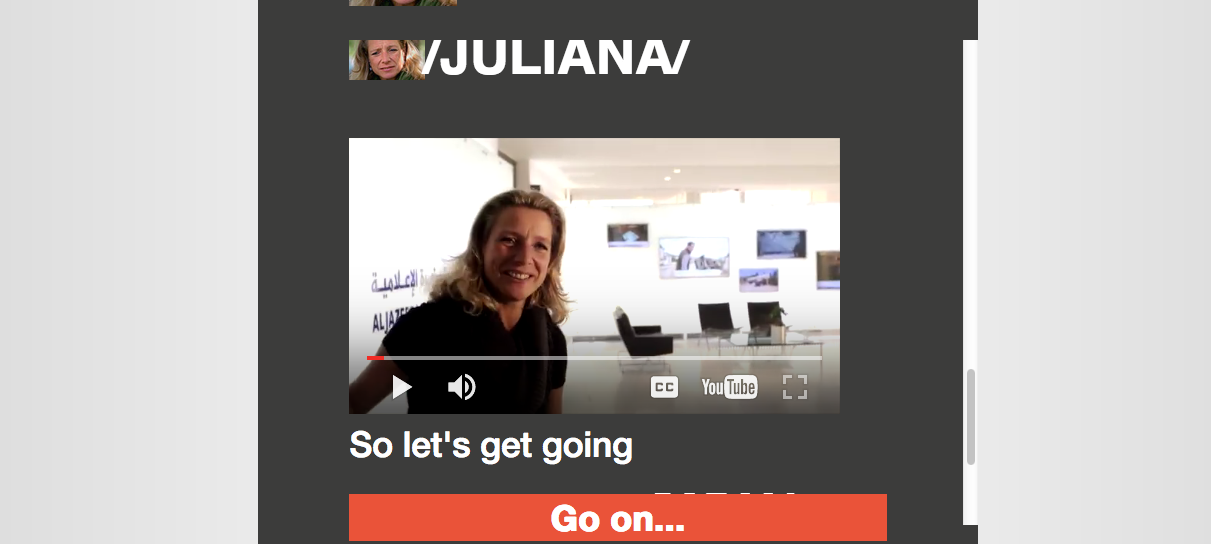This post was originally published by the International Journalists’ Network.

Image of Juliana Ruhfus courtesy of Al Jazeera.
“I hope your family’s well.”
This is the safe phrase Ziad, a Syrian producer, gives the player at the beginning of “#Hacked: Syria’s Electronic Armies,” Al Jazeera’s new interactive game.
The messaging app-based game takes the player into the complicated and dangerous world of Syria’s cyber war. Over the course of the game, the player investigates the underground conflict while exchanging with Juliana, the producer in charge of the report.
Juliana Ruhfus is a real person, just like most of the people encountered in the game. The Al Jazeera journalist produced a documentary on Syria’s cyber war in 2015. It became the basis of the innovative game she later created with a team of collaborators.
#Hacked is not Ruhfus’ first foray into game journalism. In 2014, she developed Pirate Fishing, an investigation into illegal fishing off the coast of Sierra Leone. It won Best Digital Award at the 2015 One World Media Awards. This experience helped her make #Hacked.
“The starting point was to create something where the interaction was a bit more meaningful, because personally, I felt that one of the things we could have done better with Pirate Fishing was to create an interaction that could change the outcome,” Ruhfus said.
In her newest game, the player can lose interviewees, risk their lives, get viruses and ultimately fail to file the report on time depending on the choices made.
“The starting point for the Syrian project was to say ‘Your click actually matters,’” said Ruhfus.
Ruhfus is not much of a gamer, and the Syrian project didn’t start as a game. As the team producing it kept adding interactive elements, they suddenly realized it looked a lot like one.
While Ruhfus has years of experience in making documentaries, news games lie outside her comfort zone. She collaborated with John Lau, a graduate student at the National Film and Television School in London. Lau, who studies game design, provided a fresh set of eyes and a different way of thinking, she said.
“I think I had spotted the problems and I knew what I was uncomfortable with, but I really needed somebody who understood the nature of the problems and to talk it through. John did that,” Ruhfus explained.

Image of the #Hacked team courtesy of Al Jazeera.
Ruhfus said collaboration is essential to any innovative journalism project. Her journalism experience was an asset, but she also relied on younger collaborators who had different visions and were particularly good at the technical aspects of production. Her team was comprised of professionals like Nataly Rios Goico, creative consultant at Conducttr and #Hacked co-creator; Ilze Juhnevica and Zahra Warsame, who worked part-time on the game design; Lau, who provided his game-making skills; and ethical hacker Ali Haidar, who offered his expertise in “info-sec.”
User testing played a key role in producing the game. Despite its necessity, Ruhfus said it was hard to watch at times.
“You see what goes wrong and that’s actually incredibly painful and instructive because you realize that everything you thought was clear wasn’t clear at all,” she said.
Even before starting production, she visited journalism and game design students to hear their opinions. She saw them again halfway through production, when her team had storyboarded #Hacked. She finally tested it with students who hadn’t been involved in the process.
One of the biggest challenges Ruhfus faced was making the game both fun and journalistically sound. Ruhfus wanted the game to be factual and based on real work she did for her own investigation in 2015.
“I think the most difficult decision was how many game elements to put into it, and when to draw a line when it seemed to become too fictional,” she said. “When I make a film, I make a user experience — but that’s an established convention. The problem with this format is that we had to establish our own conventions and emphasize that this is real and that it is still journalism.”
Ruhfus and her collaborators sometimes disagreed. For example, she refused their suggestion that Ziad, the Syrian producer, could die because of a security breach. She wanted the player to be able to point at a press cutting or report and see that the event had actually happened.
“I think you always walk a thin line as a journalist between having authority and knowledge that you bring to it, and, at the same time, being incredibly open and learning all the time, and giving other people a voice,” she said.
Finding new ways to tell stories to younger audiences is a common concern among journalists; news gamification is just one of these ways. In the future, Ruhfus said she hopes to experiment with augmented reality, as well.
Clothilde Goujard works as a freelance journalist, covering issues related to digital news and the future of media. She studied at McGill University (Canada) and City University London. She has experience in video journalism and social media. She loves storytelling and is an avid reader, as well as a fan of VR. Follow her @clogouj.
![]() This post was originally published by the International Journalists’ Network.
This post was originally published by the International Journalists’ Network.

